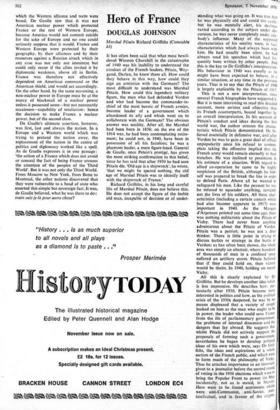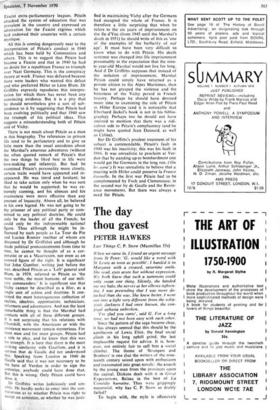Hero of France
DOUGLAS JOHNSON
Marshal Main Richard Griffiths (Constable £4)
It has often been said that what most bewil- dered Winston Churchill in the catastrophe of 1940 was his inability to understand the conduct of the French leaders. Main, Wey- gand, Darlan, he knew themall. How could they behave in this way, how could they sign an armistice with the Germans? The most difficult to understand was Marshal Main. How could this legendary military figure, the man who had defended Verdun and who had become the commander-in- chief of the most heroic of French armies, become leader of a government which abandoned its ally and which went on to collaborate with the Germans? The obvious answer was senility. After all, the Marshal had been born in 1856; on the eve of the 1914 war, he had been contemplating retire- ment; he could not, in 1940, have been in possession of all his faculties; he was a phantom leader, a mere figure-head. General de Gaulle, once Petain's protégé, has given the most striking confirmation to this belief, since he has said that after 1930 he had seen Petain die. 'Old age is a shipwreck', he wrote, 'that we might be spared nothing, the old age of Marshal Main was to identify itself with the shipwreck of France.'
Richard Griffiths, in his long and careful life of Marshal Main, does not believe this: He does not accept the figure of the feeble old man, incapable of decision or of under-
standing what was going on. It was true that he was physically old and could tire easily; but he was mentally alert, his deafness varied according to the subject under dis. cussion, he was never completely under any. body's influence. Many of the supposed characteristics of his senility were, in fact, characteristics which had always been with him. He had usually been silent, he had always read his speeches which had fie- quently been written by other people. And this is the key to Dr Griffiths's interpretation. His behaviour in 1940 was exactly as he might have been expected to behave, in a similar situation, at any time in the previous years. That is to say that the Main of 1940 is largely explicable by the Petain of 1917.
This is not a new interpretation, since several French biographies have suggested it. But it is most interesting to read this detailed account, more serious and objective than its French counterparts, bound together by an overall interpretation. In his account of Petain's conduct and ideas during the first world war, the author stresses the charac- teristic which Petain demonstrated. He be- lieved essentially in defensive war, and after Verdun he was to gain a great deal of official unpopularity since his refusal to contem- plate taking the offensive implied that the French army would remain eternally in their trenches. He was inclined to pessimism in his estimate of a situation. With regard to allied co-operation he came to be highly suspicious of the British, although he him- self was prepared to break the line in order to defend Paris. Above all he wanted to safeguard his men. Like the peasant he was he refused to squander anything, certainly not _the lives of his soldiers. All these char- acteristics (including a certain conceit which had also become apparent in 1917) were important in 1940. As the Marquis d'Argenson pointed out some time ago, there was nothing militaristic about the Petain of Vichy. There had never been anything adventurous about the Petain of Verdun. Petain was a patriot; he was not a deep thinker. There is little point in trying to discuss tactics or strategy in the battle of Verdun; as has often been shown, the whole area was simply an abattoir, where hundreds of thousands of men in a confined space suffered an artillery storm. Petain believed that if they could hold on, then victory would be theirs. In 1940, holding on meant Vichy.
All this is clearly explained by Dr Griffiths. But he develops another idea v■hich is less impressive. He describes how, Par- ticularly after 1930, Main became more interested in politics and how, as the political crisis of the 1930s deepened, he was by no means displeased that a variety of people looked on him as the man who ought to be in power, the leader who could save France from the ills of parliamentary government. the problems of internal dissension and the dangers that lay abroad. He suggests that whilst Petain did not actively support the proposals of forming such a government. nevertheless he began to develop political ideas of his own which were, says Dr Grif- fiths, the ideas and aspirations of a whole section of the French public, and which were to form much of the philosophy of VichY. Thus he attaches importance to an interview given to a journalist before the second round of voting in the 1936 elections which were to bring the Popular Front to power (in MaY incidentally, not as is stated, in March). Here were to be found sentiments which were anti-Communist, anti-Soviet, an intellectual, and in favour of the crYPtc"
Fascist extra-parliamentary leagues. Main attacked the system of education that was prevalent in the country and expressed an admiration for the Fascist regimes which had endowed their countries with a certain mystique.
All this is coming dangerously near to the interpretation of Petain's conduct in 1940 which has been held by Communists and others. This is to suggest that Petain had become a Fascist and that in 1940 he had no desire for a republican France to triumph over Nazi Germany. This is the conspiracy theory at work. France was defeated because there were leaders who wanted this defeat and who preferred Hitler to Leon Blum. Dr Griffiths expressly repudiates this interpre- tation for which there has never been any convincing evidence. But it is a pity that he should nevertheless give a sort of sub- credence to it by suggesting that Main had been evolving politically and that 1940 saw the triumph of his political ideas. This suggests a misunderstanding both of Main and of Vichy.
There is not much about Main as a man in this biography. The references to private life tend to be perfunctory and to give us little more than the usual anecdotes about the Marshal's amorous adventures (without the often quoted remark of Petain's that the two things he liked best in life were love-making and infantry). But had he examined Petain's personality more closely, certain traits would have appeared and re- appeared. He was timid and hesitant; he liked to take action only when he was sure that he would be supported; he was ex- tremely cunning, and his silences and his evasiveness were more effective than any amount of loquacity. Above all, he believed in his own legend. He was not going to be the prisoner of any political party or com- mitted to any political doctrine. He could only be the leader of all the French; he could only be the indispensable national figure. Thus although he might be in- fluenced by such people as La Tour du Pin and Lucien Romier (neither of whom are discussed by Dr Griffiths) and although he made political pronouncements from time to time, he cannot be thought of as a cor- poratist or as a Maurrasien, not even as an avowed figure of the right. It is significant that John Gunther, writing just before the war, described Main as a 'Left' general and Blum, in 1939, referred to Petain as 'the most noble, the most .humane. of our mili- tary commanders.' It is significant too that Vichy cannot be described as a bloc, as a single unit of action and doctrine. It con- tained the most heterogeneous collection of realists, idealists, opportunists, technicians, reformers and adventurers. And not the least remarkable thing is that the Marshal had contacts with all of these different groups. It is not surprising that his relations with Churchill, with the Americans or with the resistance movement remain mysterious. For most men and for most groups. Main had a role to play, and he knew that this was his strength. It is here that there is the most striking similarity with Gaullism, and it is curious that de Gaulle did not understand this. Speaking from London in 1940 de Gaulle said that it was not necessary to be the hero of Verdun in order to sign the armistice, anybody could have done that. But this is wrong. Only Petain could have done it.
Dr Griffiths writes judiciously and sen- sibly. He hardly seeks to enter into the con- troversies as to whether Petain was right to accept an armistice, or whether he was justi-
fied in maintaining Vichy after the Germans had occupied the whole of France. It is therefore a little surprising that when he refers to the six years of imprisonment on the Ile d'Yeu (from 1945 until the Marshal's death in 1951) he should write of this as 'one of the examples Of the barbarity of our age'. It must have been very difficult to know what to do with Petain. His death sentence was changed into life imprisonment presumably in the expectation that the nine- ty-year-old Marshal would not live for long. And if Dr Griffiths supposes that instead of the isolation of imprisonment, Marshal Petain could simply have returned as a private citizen to the Alpes Maritimes, then he has not grasped the violence and the bitterness of the Vichy period in French history. Perhaps he should have devoted more time to examining the role of Main in Hitler Europe (and it is noticeable that Eberhard Jacket's book is not in his biblio- graphy). Perhaps too he should not have omitted to mention that there was a ridi- culous side to Petain's complacency (and he might have quoted Jean Dutourd, as well as Celine).
But Dr Griffiths's prudent treatment of his subject is commendable. Petain's fault in 1940 was his inactivity; this was his fault in 1916. It was unrealistic to proclaim at Ver- dun that by standing up to bombardment one would get the Germans in the long run. ('On les aura'.) It was unrealistic to believe that a meeting with Hitler could preserve la France eternelle. In the first war Petain had to be complemented by Foch and Clemenceau; in the second war by de Gaulle and the Resist- ance movements. But there was always a need for Main,























































 Previous page
Previous page